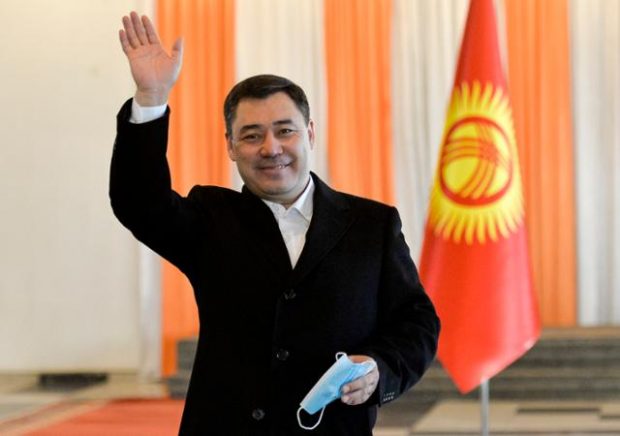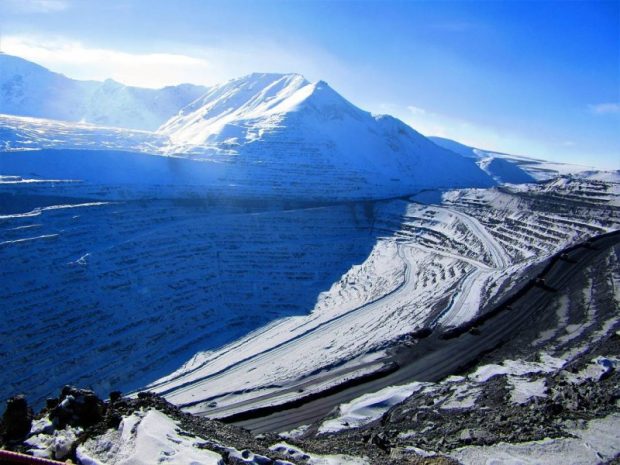키르기스스탄 자파로프 집권 안정 키워드 ’11월 총선’ ‘금광 국유화’

[아시아엔=쿠반 압디멘 키르기스스탄 국영 <카바르 뉴스에이전시> 대표, 메데르 타발디에브 프리랜서 기자] 키르기스스탄 총선이 실시된 지 1년이 흘렀다. 총선 당시 예비 집계 결과 여당이 압도적인 의석 수를 차지하자 부정선거와 표 매수 등을 외치는 범국민 시위와 소요사태가 뒤따르며 무효화된 바 있다. 부정으로 얼룩졌던 선거 결과, 제엔베코프 대통령은 자리에서 물러났고, 자파로프가 대통령 권한대행직을 맡게 됐다.
세계적인 코로나19 대유행과 무너지는 국가경제, 위기를 감당하지 못하는 정부는 키르기스스탄에 혼돈을 가져왔다. 반면 이러한 상황들이 키르기스스탄 정치에 큰 변화를 불러일으킬 것이라는 희망도 공존했다. 변화를 갈망하는 키르기스스탄 국민의 바람은 사디르 자파로프에게로 향했다.
2005년 국회의원으로 정치생활을 시작한 그는 2005년부터 2010년까지 대통령을 지낸 쿠르만벡 바키예프의 고문을 지냈다. 자파로프는 정적인 에밀베크 캅타가예프의 납치를 시도했다는 협의로 투옥되며 정치생명의 위기를 맞이하기도 했다. 그러나 지난 몇년 간 키르기스스탄 최대규모 금광의 국유화를 이끌며 지지층을 구축하는데 성공했다.
투옥 기간 중 큰아들을 포함한 가족을 잃으며 개인적인 부침도 있었다. 일부 정치 평론가들은 그가 민족주의자라고 말하기도 했지만, 지지층 대다수는 그의 개인적인 아픔에 공감했고, 이는 실질적인 득표로 연결되기도 했다. 마침내 자파로프는 2021년 1월 79%의 투표율을 기록한 키르기스스탄 대선에서 39%의 지지를 얻어 대통령에 당선됐다.
키르기스스탄 대선이 실시된 날, 내각제에서 대통령제로의 복귀를 결정하는 국민투표도 실시됐는데, 유권자의 84%가 대통령제를 선택했다. 이어 2021년 4월 헌법 개정 국민투표가 실시됐으며, 5월 자파로프 대통령은 국민투표 개정안에 서명했다. 새 헌법이 제정되면서 대통령 권한은 크게 늘어난 반면 의회 권한은 축소됐다.
대통령은 행정부 전체의 수장으로 정부 각료와 판검사, 사법기관장을 임명할 수 있는 권한을 얻었다. 대통령 임기도 6년 단임제에서 5년 중임제로 변경됐다. 이에 대해 휴먼라이트워치는 “인권 규범을 훼손하고 권력 남용을 막기 위한 견제와 균형을 악화시킨다”며 우려를 표하기도 했다.
그러나 지지자들은 강력한 지도자가 합당한 권력을 행사함으로써 여타 세력의 간섭 없이 의미 있는 개혁을 이끌 수 있을 것이라 보고 있다. 실제로 이전의 내각제 하에선 대통령이 개혁을 실시할 추진력을 얻지 못했으며, 의원 중심의 내각 또한 국가를 올바른 길로 이끌지 못했다.
격동의 1년을 보낸 키르기스스탄은 한달 뒤인 11월 28일 총선을 실시할 예정이다. 당초 지난 여름 실시될 계획이었으나, 자파로프 대통령 취임 직후 가을로 연기됐다. 다가올 총선에서 가장 큰 변화는 의석수의 축소다. 현행 120석에서 90석으로 1/4이 줄었으며, 이 가운데 54석은 전국 정당명부를 통한 비례대표로, 나머지는 전국을 36개 지역으로 나눠 선거구당 1명씩 뽑는 소선거제로 선출된다.
정당별 의석 배분 기준을 종전 득표율 7%에서 5%로 하향조정됐다. 정당들은 전국적으로 최소 0.7%의 득표율을 얻어야 존속할 수 있도록 했다. 또 하나의 큰 변화는 종전에는 등록거주지 이외의 지역에서도 투표할 수 있었으나 이번부터는 불가능하게 됐다. 그동안 해당 조항을 악용해 투표 통계를 조작하거나 특정 지역에 투표자가 몰리는 현상이 빈발했었다.
작년 실시된 총선이 무효화됨에 따라 임시의회가 의회를 대신했는데, 임시의회 구성원 다수는 부적격 논란을 불러일으키며 ‘키르기스스탄 역사상 가장 부실한 의회’라는 비판을 받아야 했다. 그러나 유감스럽게도 이들 중 다수는 내달 선거에 출마 계획을 세우고 있다. 이로 인해 키르기스스탄에선 다가올 총선에 대한 비관론 또한 팽배해 있는 상황이다. 이들은 2010년 의회로 권력이 집중되며 막강한 기득권을 손에 쥔 채 키르기스스탄의 위기를 초래한 주범으로도 지목되고 있기 때문이다.
키르기스스탄 국민들은 정치경제와 사회적인 변화를 갈망하고 있다. 사디르 자파로프 대통령이 인기를 얻고 있는 원동력은 앞서 말했듯 가장 큰 금광인 쿰토르를 국유화한 덕분이다. 1997년 이래 쿰토르 금광은 캐나다 광산회사인 센터라 골드가 소유했으나, 최대 지분은 키르기스스탄 정부가 보유하고 있다. 자파로프 지지자들은 센터라 골드의 환경 파괴 등을 이유로 “금광을 되찾아야 한다”고 주장해왔다. 광산의 수익을 둘러싼 이권다툼 또한 이러한 운동의 배경 중 하나였다.
자파로프도 대통령 출마 결심 전에는 쿰토르를 국유화하겠다는 입장을 고수했으나, 이후 엇갈린 메시지를 보내며 혼란을 가중시킨 측면도 있다. 석방된 지 나흘 만에 “금 보유고가 얼마 남아 있지 않아 국유화 조치를 취하기엔 너무 늦었다”고 밝혔는가 하면, 선거 유세 중에는 “쿰토르는 국민들의 것이며 국익을 우선시해야 한다”고 말하기도 했다. 금광 소유권에 대한 논란은 현재진행형이다. 미국 뉴욕 남부 파산법원이 개입되며 상황은 복잡하게 흘러가고 있다. 이는 현 정부가 맞닥뜨릴 최대 난제가 될 수도 있다.
최근 키르기스스탄 고위 관리들은 스위스에서 쿰토르 금광의 CEO를 만나 이 같은 상황에 대해 논의한 것으로 알려졌다. 세부사항은 공개되지 않았으나, 양측은 협상의 진전 여부를 강조했다. 정부 측은 “캐나다 측이 쿰토르를 떠날 것이며, 소유권 또한 포기할 것”이라 밝혔다. 문제는 양측이 합의한 금액의 크기다.
키르기스스탄 국민들은 △쿰토르를 둘러싼 논란 △수차례에 걸친 알맹이 없는 선거 △지속되는 코로나19 상황 △국가적 경제 위기에 몹시 지쳐있다. 2020년 이맘때 대규모 시위에 이은 정치적 변화는 분명 희망찬 첫 걸음을 내딛는 것이었다. 하지만 복잡하고 지루한 과정 속에서 잊으려 했던 현실의 위기가 다시금 떠오르기 시작했다. 그럼에도 키르기스스탄 국민들은 혼란이 종식되고 안정이 찾아올 것이라 믿는다. 수많은 이들의 희망을 품고 출범한 자파로프 정부, 아직까진 시간이 더 필요해 보인다. <번역 이주형 기자>

Kyrgyzstan: What future expects the country in turbulence?
by Kuban Abdymen Meder Taabaldiev.
In Kyrgyzstan October 4th marked one year since the 2020 parliamentary election, the results of which sparked massive protests ? a culmination of previous president Sooronbai Jeenbekov’s incompetent rule. Pro-government parties took an overwhelming majority of the seats according to the preliminary results. Based on many instances of electoral fraud and vote buying opposition parties staged a protest the next day, which erupted into unrest by evening.
Former president Almazbek Atambayev and future president Sadyr Japarov were freed from prison. The failed elections would soon after lead president Jeenbekov to resign and Japarov to become acting president. Amidst the global pandemic, crumbling economy and the government’s complete inability to handle these crises, there was hope that the events that took place would bring considerable change in Kyrgyz politics.
Much of the people’s hope seemed to have been singularly entrusted to Sadyr Japarov. He had a turbulent and explosive career ? he was elected as a member of the parliament in 2005 and then he became adviser to ousted president Kurmanbek Bakiyev. He was later exiled and then imprisoned for an attempt to kidnap rival politician Emilbek Kaptagaev.
Yet he still managed to gather a devoted following in the recent years for being a strong proponent of nationalizing Kumtor (Kyrgyzstan’s largest gold mine). Japarov also suffered personal tragedy during his prosecution and prison term ? losing several family members, including his eldest son. Many of his fans express sympathy and relate to both his political views, which some critics view as nationalist, and to the misfortunes in his personal life.
With their unprecedentedly passionate and vocal support he was able to be elected as president of Kyrgyzstan in January 2021, gathering 79% of the votes, with a 39% voter turnout (smallest turnout for a presidential election yet).
Alongside presidential elections, the people of Kyrgyzstan voted in a government system referendum the same day, where 84% of the voters expressed their preference to step away from a parliamentary system of government and readopt a presidential system.
This was followed by another constitutional referendum held in April 2021 to adapt a newly drafted constitution. It was approved by 85% of the voters and signed by Japarov into law in May 2021. With the new Constitution the president’s power was significantly increased, while the parliament’s authority was diminished. The president became the head of the entire executive branch and gained the ability to appoint government ministers, almost all judges and law enforcement chiefs.
The president, who could previously only serve a single six year term, can now assume power for two consecutive five-year long terms. The new Constitution makes the president the central figure again, giving him a supra-strong mandate. The Human Rights Watch deemed the new constitution problematic as it “undermines human rights norms and weakens checks and balances necessary to prevent abuses of power”. The supporters of this change, however, view it as an opportunity for a singular person to take charge and make stronger and significant changes with less interruption from other agencies.
In reality, the previous parliamentary system of government never truly saw the parliament assume their full power and influence under previous regimes, as in practice it was continuously impaired by the presidents’ influences and hindrances. The new constitutional change brings about the legitimacy of the president’s powers.
The new and revised parliamentary elections are scheduled to take place on 28 November 2021. Though they were promised to take place no later than summer 2021, President Japarov announced their postponement to autumn soon after taking office. As signed into law on 5 May 2021, the elections are to be held in accordance to a mixed electoral system.
The size of the parliament reduced from 120 to 90 seats. Out of them 54 are to be selected by proportional representation through national party lists, while the remaining 36 are selected in individual single seat districts. The threshold for parties to pass into parliament was also reduced from 7% to 5% of all votes, with a requirement to get at least 0.7% of votes in each region of the country.
A major change was the abolition of Form No. 2 ? a document allowing Kyrgyz citizens to vote in places outside of the districts where they are documented to be officially residing. This measure was taken due to parties abusing the document and having an overwhelming number of people vote in different regions to manipulate the vote stats.
Because the results of the parliamentary elections were annulled, the previous parliament members remained in their positions as part of the interim parliament. It was deemed by many experts as the most inept parliament to date, due to an unqualified cast that sparked many controversies, jokes and viral videos.
Much to people’s dismay, many of the same people are planning to participate in the new elections. These same people were also among the party lists in the annulled elections of 2020. As such, the common sentiments among many people in regards to the new parliamentary elections are that of pessimism. After all, the parliament as an establishment has become the main culprit to blame for the crises that befell Kyrgyzstan after the country’s shift to a parliamentary system in 2010.
As mentioned before, the people of Kyrgyzstan hoped for change ? politically, economically and socially. One of the driving forces of Sadyr Japarov’s popularity was his resolve to nationalize the Kumtor Gold Mine ? one of the largest gold mines in the region. Since 1997 Centerra Gold, a Canadian mining company, has been its owner, while Kyrgyzstan held the largest share of the company.

Advocates have been adamant about “taking Kumtor back” due to accusations of Centerra Gold’s environmental violations. It has been also commonly understood that another big reason for this movement was the desire to have complete control over the mine’s earnings. Though Japarov has been consistent in his stance to nationalize Kumtor before becoming president, he has sent mixed messages after. He expressed that it was “too late” to take any measures because “…there are no gold reserves left there” only four days after being freed from prison. However, he later announced “…Kumtor belongs to the people and should work in the interests of the people” during his campaign.
The messy controversy with the ownership of the gold mine is still ongoing, now involving the US Bankruptcy Court for the Southern District of New York, becoming the main issue on the government’s agenda and weighing heavy on people’s minds. This process might become the biggest challenge that the current administration will face.
Although there is some contradictions, Kyrgyz high officials recently have met in Swisserland with Scot Perry – CEO of Kumtor Gold Mine and discussed the situation. Unfortunately there was not announced the details of the meeting and the same time both side underlined about the moving forward in the negotiations. Kyrgyz officials expressed satisfaction with that meeting and hinted that Canadian side seems to leave Kumtor and would not insist to take it back. Question is what price both side would agree to pay?
The convoluted process with Kumtor, several consecutive elections, ongoing coronavirus pandemic and economic crisis have left the people of Kyrgyzstan tired. The political shift that followed the 2020 protests brought hope at first, but drawn out processes and continuous crises seemed to have brought back the sense of reality. Nevertheless, it stands to reason that people are most tired of disruption and will prefer stability over turmoil. With so much hope bestowed upon Japarov and his government, only time will tell where that hope brings Kyrgyzstan next.





